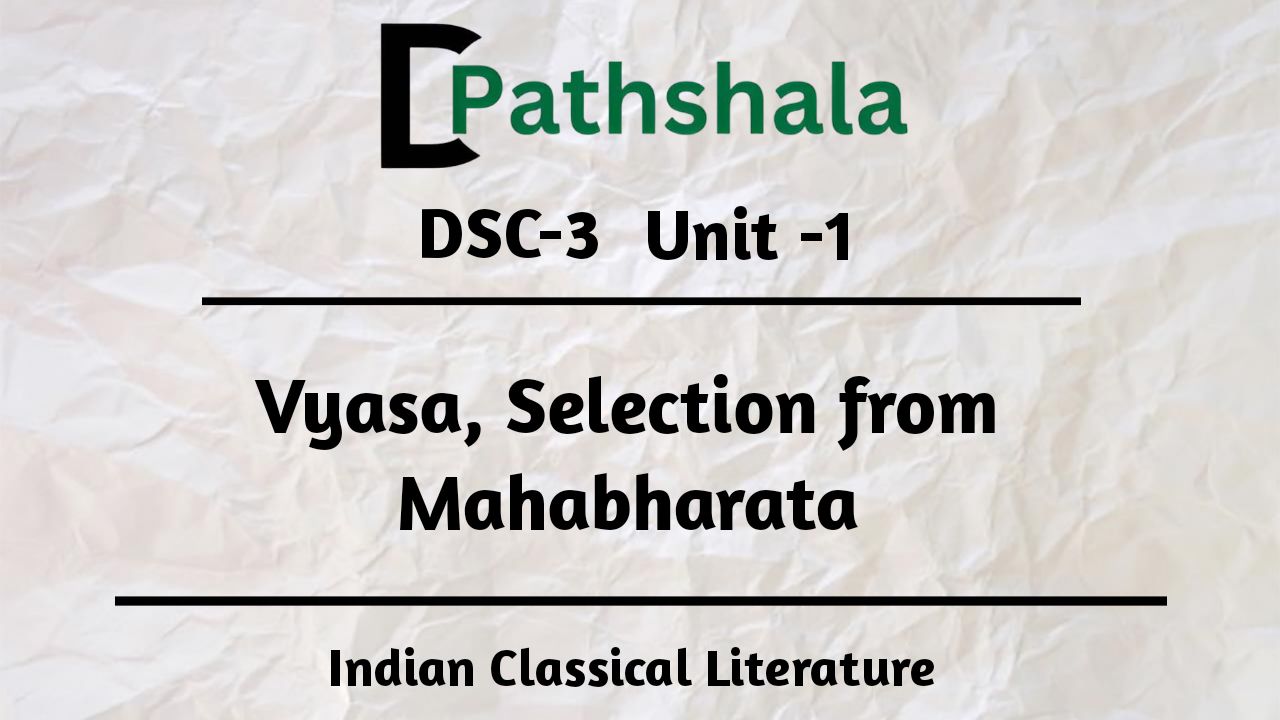In this post, notes of Unit 1 (Vyasa. Selections from The Mahabharata) from DSC – 3 (Indian Classical Literature) are given which is helpful for the students doing graduation this year.
Introduction: Vyasa and his epic
Who is Vyasa and why is he known as the author of the Mahabharata?
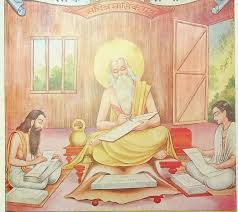
Vyasa, also called Vedavyasa or Krishna Dvaipayana Vyasa, is an important figure in Hindu tradition. He is known for putting together and writing the Mahabharata, which is one of the longest and most important ancient Indian texts. The Mahabharata includes over 100,000 verses and covers many aspects of life and morality.
Key points about Vyasa and the Mahabharata:
- Birth: Vyasa was born to the sage Parashara and a fisherwoman named Satyavati. His name means “dark island-born.”
- Vedas: He organized the Vedas, which are sacred texts, into four parts: Rigveda, Samaveda, Yajurveda, and Atharvaveda.
- Writing the Mahabharata: Vyasa narrated the Mahabharata to the sage Vaishampayana, who told it to King Janamejaya. The story includes a conversation between Vyasa and the sage Ganesha, who writes down the verses.
- Bhagavad Gita: The Mahabharata contains the Bhagavad Gita, a dialogue between Prince Arjuna and Lord Krishna about life and duty. Vyasa is seen as the narrator of this important scripture.
- Other Works: Vyasa is associated with other texts, including the Puranas. He is also recognized as one of the seven immortal beings in Hindu belief.
- Legacy: Vyasa is honored as a wise sage who shared knowledge. His work has greatly influenced Hindu philosophy and storytelling.
Vyasa is more than just an author; he is viewed as a wise figure who shares important truths through his stories. His legacy is celebrated in many Hindu traditions.
What are the main themes and characters of the Mahabharata?
The Mahabharata covers many themes and has numerous characters, creating a rich story. Here are the main themes and characters:
Main Themes of Mahabharata:
- Dharma (Righteousness): The story focuses on duty and morality, showing the importance of doing what is right.
- Karma (Action): It teaches that actions have consequences, and people are responsible for what they do.
- War and Peace: The epic centers around the Kurukshetra War, exploring the nature of war and its effects on society.
- Family and Relationships: It examines complex family ties, including love, rivalry, loyalty, and betrayal within the Kuru family.
- Duty vs. Desire: Characters struggle between their responsibilities and personal desires.
- Friendship: The bond between Krishna and Arjuna, and among the Pandavas, shows the importance of loyalty.
- Philosophical Teachings: The Bhagavad Gita includes deep philosophical discussions about life and duty.
Main Characters in Mahabharata:
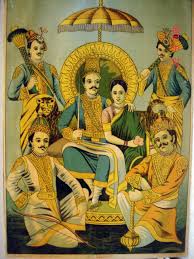
- Pandavas:
– Yudhishthira: The eldest, known for his truthfulness.
– Bhima: The strong second brother.
– Arjuna: A skilled archer, key to the Bhagavad Gita.
– Nakula and Sahadeva: The handsome twi`n brothers.
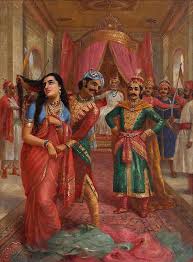
- Kauravas:
– Duryodhana: The main antagonist, driven by jealousy.
– Dushasana: Duryodhana’s brother, involved in Draupadi’s humiliation.
– Karna: A loyal ally of Duryodhana with a tragic fate.
- Krishna: A central figure who guides Arjuna and shares wisdom in the Bhagavad Gita.
- Draupadi: The shared wife of the Pandavas, symbolizing strength and resilience.
- Bhishma: The respected granduncle of both families, facing moral conflicts.
The Mahabharata weaves together various stories and lessons about human nature and the world.
How is the Mahabharata important to Indian culture and literature?
The Mahabharata is very important in Indian culture and literature. Here are some ways it remains relevant:
- Moral Guidance: It teaches moral values and the importance of doing what is right (dharma).
- Cultural Values: The epic reflects social norms and the importance of family and duty in Indian culture.
- Religious Significance: The Bhagavad Gita, part of the Mahabharata, offers spiritual guidance and addresses life’s questions.
- Literary Influence: It has inspired many stories, poems, and plays in different Indian languages.
- Storytelling Tradition: As one of the major epics, it has shaped the storytelling tradition in India, passed down through generations.
- Performing Arts: The stories are adapted into plays and dances, showcasing their impact on dramatic arts.
- Art and Iconography: The Mahabharata inspires visual art, including paintings and sculptures.
- Political Reflection: It explores themes of governance and power struggles, relevant to today’s political discussions.
- Universal Themes: The epic addresses timeless themes like good vs. evil, making it relevant worldwide.
In summary, the Mahabharata is a key text that influences various aspects of Indian life, from morality and philosophy to art and culture.
The Dicing and Sequel to Dicing:
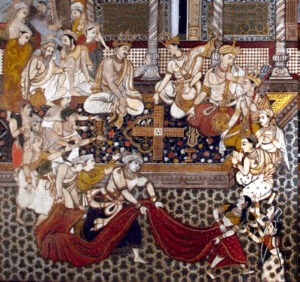
What is the significance of the game of dice between the Pandavas and the Kauravas?
The game of dice is a crucial event in the Mahabharata that leads to the Kurukshetra War. Here’s its significance:
Context:
- Family Conflict: The Kuru family is divided into two sides: the Pandavas and the Kauravas. Yudhishthira, the eldest Pandava, is the rightful heir, but Duryodhana, the eldest Kaurava, feels jealous.
- Duryodhana’s Ambition: Duryodhana wants to become the sole ruler and is angry at the Pandavas’ popularity.
- Shakuni’s Manipulation: Duryodhana’s uncle Shakuni manipulates the situation to exploit Yudhishthira’s weakness for gambling.
- Invitation to Play: Duryodhana invites Yudhishthira to a game of dice, hiding his true plan to defeat the Pandavas.
Significance:
- Deception: The game involves cheating. Shakuni ensures Duryodhana wins, while Yudhishthira, out of honor, continues to play even as he loses everything.
- Draupadi’s Humiliation: After losing everything, Yudhishthira is forced to gamble Draupadi. She is publicly humiliated, which intensifies the conflict.
- Vow of Revenge: The Pandavas are exiled for 13 years, leading them to vow revenge against the Kauravas, which sets the stage for the war.
- Deterioration of Relations: The game worsens the relationship between the two factions, turning a family dispute into a larger conflict.
- Character Flaws and Virtues: The episode reveals the strengths and weaknesses of the characters, like Yudhishthira’s commitment to duty and Duryodhana’s ambition.
- Setting the Stage for War: The humiliation of Draupadi becomes a reason for the Pandavas to fight back, making the game a turning point in the story.
In summary, the game of dice is a dramatic moment that highlights human relationships, character flaws, and sets off events leading to the Kurukshetra War.
How does Draupadi suffer humiliation from the Kauravas?
Draupadi’s humiliation in the Mahabharata is a significant and painful event. Here’s how it unfolds:
- Losing the Stakes: During the rigged dice game, Yudhishthira, the eldest Pandava, loses everything, including Draupadi, in the gamble.
- Summoned to the Assembly: Duryodhana insists that Draupadi be brought into the assembly, which is against the norms of the time since women were not meant to be present in such places.
- Forced Entry: Dushasana, Duryodhana’s brother, drags Draupadi into the court, ignoring her pleas for dignity.
- Public Mockery: Duryodhana mocks the Pandavas and claims Draupadi is now a slave because they lost her in the game.
- Disrobing Attempt: Dushasana tries to strip Draupadi in front of everyone, which is a gross violation of her honor. She prays to Lord Krishna for help.
- Divine Protection: As Dushasana attempts to disrobe her, her saree miraculously keeps unraveling, preserving her modesty, seen as divine intervention.
- Vow for Revenge: After this humiliation, Draupadi vows not to tie her hair until she can avenge the insult by taking Dushasana’s blood. This vow motivates the Pandavas in their quest for justice.
Draupadi’s suffering highlights the vulnerability of women in a patriarchal society and symbolizes the consequences of unchecked power.
How do the Pandavas react to their defeat and exile?
The Pandavas respond to their defeat and exile with a mix of shock, sadness, and determination. Here’s how they react:
- Shock and Disbelief: Initially, the Pandavas are stunned by the outcome of the dice game. Yudhishthira feels compelled to honor the wager despite realizing it was unfair.
- Realization of Injustice: The loss of their kingdom and dignity makes them aware of the injustice they faced. Yudhishthira struggles with the dishonor brought upon them.
- Draupadi’s Humiliation: Witnessing Draupadi’s public humiliation deeply affects the Pandavas, adding to their emotional pain and sense of injustice.
- Vow for Revenge: Draupadi’s vow to avenge her humiliation inspires the Pandavas to seek justice against the Kauravas.
- Acceptance of Exile: They agree to go into exile for 13 years, preparing for the hardships ahead while planning to return stronger.
- Preparation for Exile: Despite their grief, the Pandavas gather themselves to leave Hastinapura, along with Draupadi.
- Bhishma’s Support: Bhishma, an elder, expresses his disapproval of the events but is powerless to stop them.
- Promise of Return: The Pandavas make it clear that their exile is not an acceptance of defeat; they vow to reclaim their kingdom.
In summary, the Pandavas’ reaction to their defeat and exile is marked by shock and a strong desire for revenge, setting the stage for the coming conflict.
What are the moral and ethical dilemmas faced by the characters in this episode?
In the game of dice episode, characters face various moral and ethical dilemmas, highlighting themes of duty, honor, and justice. Here are the main dilemmas:
- Yudhishthira’s Dilemma:
– Duty vs. Integrity: He struggles between his duty to play the game as a warrior and his personal values, questioning the morality of gambling.
– Gambling Addiction: His weakness for gambling raises ethical questions about the implications of pursuing desires at the cost of duty.
- Draupadi’s Humiliation:
– Justice vs. Injustice: Her public humiliation raises questions about the treatment of women and the responsibilities of those in power to protect the vulnerable.
– Power Dynamics: The elders’ silence during her humiliation questions the ethics of standing up against wrongdoing, even at personal risk.
- Duryodhana’s Ambition:
– Ambition vs. Ethics: Duryodhana’s desire for power leads him to manipulate the game, challenging the morality of seeking power through deceit.
– Jealousy and Ethics: His jealousy towards the Pandavas forces a reconsideration of ethical limits in pursuing personal goals.
- Shakuni’s Deception:
– Fairness vs. Deceit: Shakuni’s manipulation of the game raises questions about fairness and the integrity of competition.
- Bhishma and Drona’s Silence:
– Loyalty vs. Morality: They face a struggle between loyalty to the Kuru clan and their moral responsibility to speak out against Draupadi’s humiliation.
– Compromise of Values: Bhishma’s disapproval but lack of action highlights the challenge of upholding moral values in difficult situations.
These dilemmas reveal the complexities of human relationships and the impact of choices in the unfolding tragedy of the Mahabharata.
The Temptation of Karna:
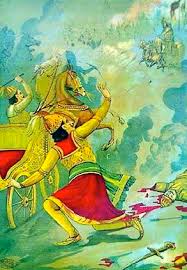
Who is Karna?
Karna is an important character in the Mahabharata, known for his loyalty and tragic story. Here’s a simple breakdown of who he is and his connections with the Pandavas and Kauravas:
- Birth and Early Life of Surya Putra Karna:
– Karna is born to Kunti, the mother of the Pandavas, before she marries King Pandu. Kunti uses a special power to call a god, the sun god Surya, to have a child. She places Karna in a basket and sends him down a river.
– A charioteer named Adhiratha and his wife Radha find and raise him, without knowing his true background.
- Karna’s Friendship with Duryodhana:
– Karna becomes friends with Duryodhana, the leader of the Kauravas. When Duryodhana is teased by the Pandavas for not being a good archer, Karna stands up for him and pledges his loyalty.
– Duryodhana, impressed by Karna’s skills, makes him the king of Anga.
- Karna’s Relationship with Pandavas:
– Karna’s bond with the Pandavas is tricky. He is actually their half-brother but doesn’t know this for most of his life. He stays loyal to Duryodhana and rivals Arjuna, one of the Pandavas.
- Challenges Faced by Karna:
– Karna faces many challenges, including learning about his true birth later on. Even when given chances to switch sides, he chooses to stick with Duryodhana.
- Karna’s Role in the War:
– Karna plays a key role in the Kurukshetra War, leading the Kaurava army. He meets a tragic end when Arjuna kills him during the battle.
- Character Traits:
– Karna is known for his bravery, generosity, and loyalty. He is a skilled archer, but his strong loyalty to Duryodhana and feelings of injustice in his life lead to his downfall.
Karna’s story is a complex mix of loyalty, virtue, and fate, making him a tragic figure in the Mahabharata.
Krishna’s Attempts to Persuade Karna:
Krishna tries to convince Karna to join the Pandavas before the war starts. Here’s how he does it:
- Kunti’s Revelation:
– Kunti tells Karna that he is her son and urges him to join the Pandavas.
- Krishna’s Diplomacy:
– Krishna talks to Karna, stressing the importance of doing what is right and supporting Yudhishthira, the rightful king.
- Offer of Kingdom:
– Krishna offers Karna the kingdom of Hastinapura if he switches sides, assuring him of the respect he deserves.
- Warnings about Duryodhana:
– Krishna warns Karna about Duryodhana’s true intentions and how he is being used.
- Advice from Elders:
– Krishna, along with wise elders like Bhishma and Drona, advises Karna to consider the righteousness of the Pandavas’ cause.
- Final Plea:
– On the battlefield, Krishna urges Karna to fight for his brothers, revealing his true identity and destiny.
Despite all this, Karna remains loyal to Duryodhana, valuing his friendship more than his own family ties.
Reasons Karna Doesn’t Switch Sides:
Karna’s choice to stay with Duryodhana is influenced by various feelings and reasons:
- Gratitude:
– Karna feels thankful to Duryodhana for his support and friendship.
- Sense of Belonging:
– He finds acceptance with Duryodhana and the Kauravas, especially after facing discrimination due to his background.
- Resentment:
– Karna holds a grudge against the Pandavas, particularly Arjuna, for past insults.
- Commitment to Friendship:
– His loyalty to Duryodhana and the promise he made to him is very important to Karna.
- Distrust of the Pandavas:
– He does not trust the Pandavas and believes they are not as virtuous as they seem.
- Pride in Abilities:
– Karna takes pride in his skills and feels that switching sides would be a loss of honor.
- Acceptance of Fate:
– He believes he is meant to fight against his own brothers, accepting it as part of his destiny.
These feelings lead Karna to remain loyal to Duryodhana, ultimately resulting in his tragic fate in the war.
Karna’s Loyalty and Generosity to Duryodhana:
Karna shows his loyalty and generosity to Duryodhana in many ways:
- Friendship Pledge:
– Karna stands by Duryodhana when he is ridiculed and pledges his loyalty.
- Becoming King:
– Duryodhana makes Karna the king of Anga, showing his trust.
- Support in Games:
– Karna supports Duryodhana during the unfair game of dice, not questioning his actions.
- Gift of a City:
– He gifts Duryodhana the city of Malini, showcasing his generosity.
- Promise to Kill Arjuna:
– Karna vows to kill Arjuna in gratitude for Duryodhana’s support.
- Refusal of Krishna’s Offers:
– Even when Krishna offers him a kingdom, Karna declines, valuing his friendship more.
- Participation in War:
– Karna fights bravely in the Kurukshetra War, committed to Duryodhana.
- Sacrifice of Armor:
– He gives away his divine armor and earrings to help Duryodhana, despite the risks.
Karna’s actions demonstrate his unwavering loyalty and generosity to Duryodhana, even at great personal cost.
Krishna’s Peace Proposal:
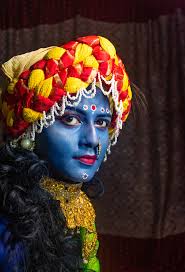
Krishna’s peace mission seeks to prevent the Kurukshetra War. Here’s the background and purpose:
Background of Krishna’s Peace Proposal:
- Rising Tensions:
– Hostility between the Pandavas and Kauravas has grown, especially after the unfair game of dice.
- Failed Diplomacy:
– Previous attempts to negotiate peace have failed, leading to an impending war.
Purpose of the Peace Mission:
- Preventing War:
– Krishna wants to avoid the destruction that war would bring.
- Appeal to Duryodhana:
– He tries to reason with Duryodhana, emphasizing the need for peace.
- Offering Compromise:
– Krishna suggests giving the Pandavas just five villages instead of the whole kingdom.
- Teaching about Dharma:
– He shares wisdom about righteousness and the responsibilities of rulers.
- Involving Karna:
– Krishna approaches Karna, hoping to sway him to the side of justice.
- Duryodhana’s Rejection:
– Despite Krishna’s efforts, Duryodhana refuses to compromise, leading to a breakdown of talks.
- War Becomes Inevitable:
– Krishna returns to the Pandavas, confirming that war is unavoidable.
Krishna’s mission highlights his commitment to peace and righteousness, but Duryodhana’s pride leads to the war.
Krishna’s Arguments for Peace:
Krishna makes several arguments and conditions for peace:
- Addressing Duryodhana:
– Krishna speaks directly to Duryodhana, warning him about the consequences of war.
- Proposing a Compromise:
– He suggests the Pandavas take five villages to avoid conflict.
- Emphasizing Dharma:
– Krishna stresses the importance of justice and moral duty.
- Warning about Sin:
– He cautions Duryodhana against the immorality of causing harm to family.
- Persuading Karna:
– Krishna talks to Karna, urging him to switch sides for righteousness.
- Advocating Dialogue:
– He promotes understanding and negotiation as means to resolve disputes.
- Offering Mediation:
– Krishna offers to mediate to help reach a fair settlement.
- Appealing to Elders:
– He encourages elders like Bhishma and Drona to guide Duryodhana towards peace.
Despite Krishna’s sincere arguments, Duryodhana remains stubborn, leading to war.
Kauravas’ Response to Peace Proposal:
The Kauravas, led by Duryodhana, respond negatively to Krishna’s peace proposal:
- Duryodhana’s Pride:
– Duryodhana outright rejects Krishna’s offer, driven by arrogance.
- Ignoring Krishna’s Wisdom:
– He dismisses Krishna’s advice and warnings about the war.
- Refusal to Compromise:
– The Kauravas refuse to give up any part of the kingdom.
- Rejecting Mediation:
– Duryodhana does not accept Krishna’s offer to mediate.
- Karna’s Loyalty:
– Karna remains loyal to Duryodhana, reinforcing their decision.
Consequences of Rejection:
- War Begins:
– The refusal to accept peace leads to the Kurukshetra War.
- Loss of Lives:
– The war results in massive casualties on both sides.
- Destruction of Families:
– Families are torn apart, causing deep grief and loss.
- Fulfillment of Destiny:
– The rejection of peace fulfills the tragic destiny of the characters.
- Divine Intervention:
– The war sees divine influences, particularly Krishna guiding Arjuna.
The Kauravas’ rejection of peace leads to devastating consequences, showcasing the pitfalls of pride and conflict.
Krishna’s Revelation of His Supreme Form:
Krishna reveals his supreme form, known as the Vishvarupa, during the Kurukshetra War:
Context:
– Just before the battle, Arjuna doubts the morality of fighting against his kin.
Arjuna’s Dilemma:
– He feels torn between his duty as a warrior and his love for his family.
Krishna’s Teachings:
– Krishna teaches Arjuna about duty, righteousness, and the eternal nature of the soul.
Vishvarupa Revelation:
– Krishna then shows Arjuna his divine form, which represents the entire universe.
Description of Vishvarupa:
– The form includes countless faces and divine attributes, showcasing creation and destruction.
Impact on Arjuna:
– Arjuna is overwhelmed and gains insight into the nature of reality and duty.
Krishna’s Universal Nature:
– Krishna emphasizes his role as the source of all creation and cosmic order.
Response of the Kauravas:
– The Kauravas also see Krishna’s form but fail to understand its significance.
In summary, Krishna’s revelation of his supreme form serves as a pivotal moment, displaying his divine power and providing deep insights into duty and the universe.

